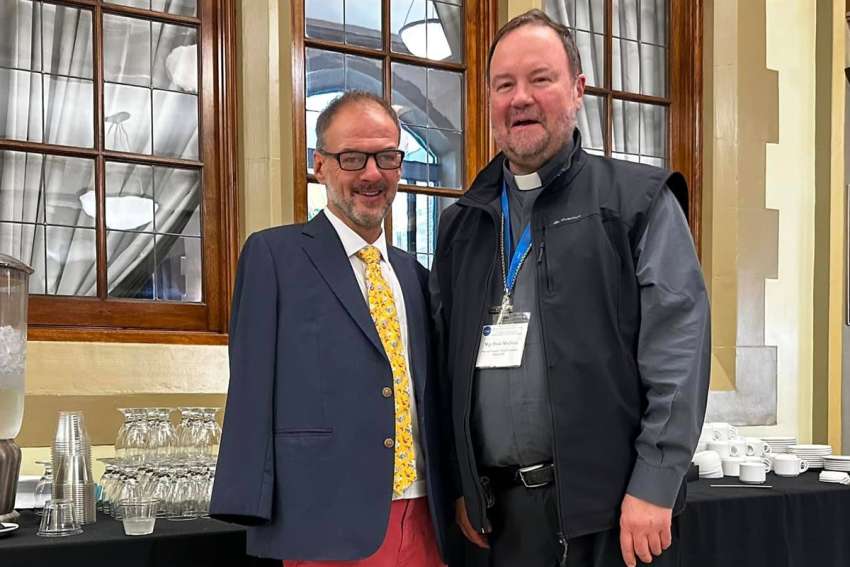“God uses suffering to purge sin from our life,” said Tada, “to strengthen our commitment to Him, force us to depend on grace and bind us together with other believers.”
Considering the multiple enthusiastic standing ovations John Foppe received during and after his keynote speech at the Society of St. Vincent de Paul (SSVP) Annual National Formation conference in Calgary on June 21, it’s fair to state Vincentians in attendance deemed him such a masterwork.
Foppe, executive director of the SSVP in the Archdiocese of St. Louis, was born 53 years ago without any arms. Though he cannot hold hands, enwrap his loved ones in an ardent embrace or offer CPR to a fellow castaway on a deserted island (a scenario he floated), God nevertheless gifted him with the ability to touch thousands through the power of his words and visible resilience.
Throughout his intimate, insightful, hour-long presentation at Southern Alberta Institute of Technology’s (SAIT) Heritage Hall, Foppe alternated between sitting and standing. While seated, he wowed attendees by opening a canned soda with a toe and effortlessly holding a mug with his feet while he sipped his drink. More impressively, the Missourian revealed he could independently operate a motor vehicle.
During a professional speaking career dating back to the early 1990s, Foppe has never preached about human beings possessing the innate strength to overcome any limitation in their path. Quite the contrary.
Foppe has observed that many people exhibit “a lack of faith and a desire for control” through their flight or fight response when tested with profound tribulation. Men or women either retreat from their trials through self-destructive vices or tap into their self-resolve to regain power and influence regardless of the ramifications of their "ends justify the means" actions.
“Fr. Richard Rohr states ‘the opposite of faith is not doubt, it’s control,’ ” said Foppe. “We like to take matters into our own hands to avoid suffering and control things. Often, our independent, rugged individualism rebels against this notion of (suffering). You see, on a visceral level, we often reject the universal truth of our human existence: in weakness, we are strong; in emptiness, we are fulfilled.”
In other words, God is in control.
“I realize that there are times when we all want to give up, but I have to urge you to persist in these moments,” said Foppe. “Those are the moments to give it over to God. It is only when we recognize our powerlessness… only when we move beyond ourselves.”
Foppe learned this lesson in a spiritually awakening way during a high school trip to a hospital in Haiti. Deeply affected by the sight of malnourished children of “mere skin and bones” along with the smells and claustrophobia of this concrete bunker, he ruminated about “the horror” he felt as a very young child being poked and prodded at by doctors while being deprived of his parents’ presence.
A young orphan boy jolted the then 16-year-old into the present moment with a warm hug.
“He was probably five or six years old,” recalled Foppe. “He threw his arms around my waist, looked up at me with his big brown eyes, and I looked down at him, exchanging a glance that seemed to last an eternity because of how painful it was. I had one thought clanging through my mind like a bell getting louder and louder: ‘you don’t have the arms to pick up this child.’ With every thought, I grew more powerless, helpless and angry. I wanted to be a source of comfort.”
The young Foppe remained haunted by this encounter for the rest of his Haitian sojourn. He questioned God for His call to serve brothers and sisters experiencing poverty and depravity when “You don’t give me the ability to help.”
Suddenly, introspection sparked illumination.
“The boy wasn’t looking for me to pick him up,” said Foppe. “The boy did something in two seconds that I struggled my entire life to do. He looked right past my condition and my problems and touched my heart.
“I realized that his particular poverty identified with my physical poverty. As if to say, ‘I see your pain. I get your struggle. There is nothing we can give each other but our love. Let’s just be there for each other.’ ”
Though Foppe lauded his fellow Vincentians for “being doers of the Church” who are guided by a spirit of fixing problems, he reminded them of the importance of "just being there for, empathize with, listen to, cry with and hold” the men, women and children God is calling them to support in times of abundance or hardship.


